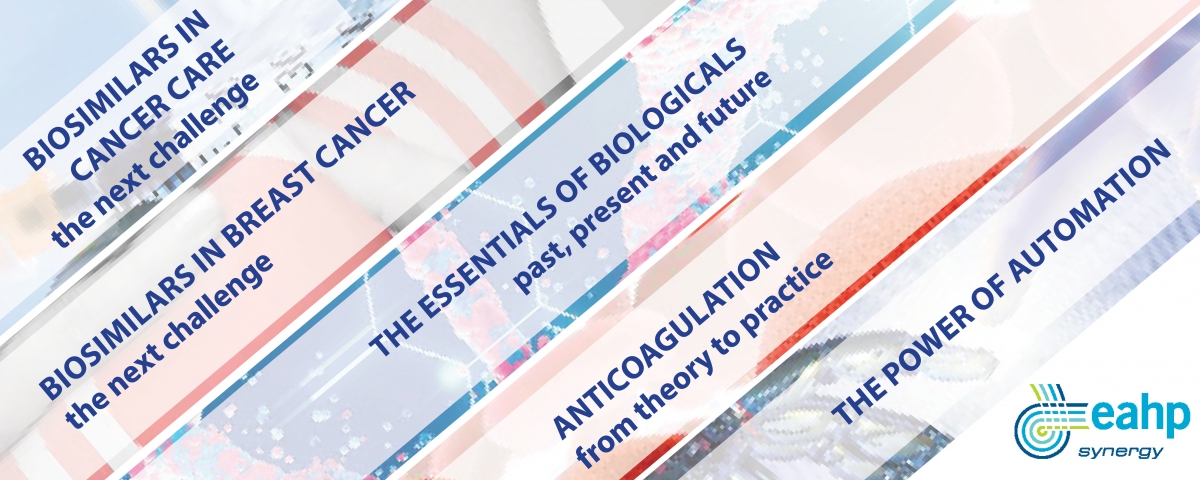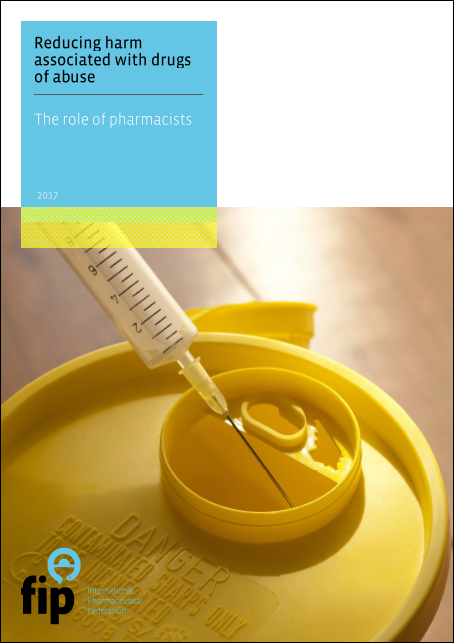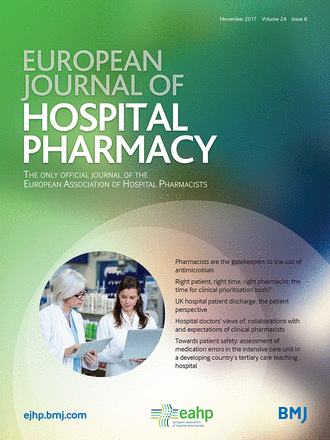EAHP EU Monitor - 12 December 2017
 The EAHP EU Monitor is a regular round up of news relevant to hospital pharmacy in Europe.
The EAHP EU Monitor is a regular round up of news relevant to hospital pharmacy in Europe.
You can subscribe to receive the EAHP EU Monitor by email HERE.
EAHP2018 – Hospital pharmacists show us what you can do!

Only 3 ½ months to go before the start of the 23rd Congress of the European Association of Hospital Pharmacists (EAHP). Gothenburg, Sweden will be hosting European and international hospital pharmacists from 21-23 March 2018 that want to share achievements of the profession, be inspired and explore ideas for future development. To help hospital pharmacists prepare for and provide cutting edge innovation in service delivery and patient care, EAHP has developed Synergy Satellites.
Synergy Satellites are accredited high level sessions developed and managed by the EAHP Scientific Committee and supported by industry educational grants. The Synergy programme is based on a needs assessment conducted by the scientific committee and attending participants may obtain continuing education points. The five sessions of the upcoming EAHP Congress will focus on biosimilars and biologicals, automation as well as anticoagulants.
Two biosimilar Synergy Satellites will concentrate on cancer therapy, since patent expirations for biologics that have long been used in the targeted treatment of cancer are now occurring. Biosimilars in cancer care - the next challenge (financial support was provided by Pfizer Limited as a Medical and Educational Goods and Service) will approach this subject from a broader angle by providing participants with the key fact on biosimilar approval in the EU as applied to cancer therapy. By understanding the concepts and facts, hospital pharmacists will be enabled to provide a scientific, unbiased approach with a focus on patient care in a world of limited resources.
Biosimilars in breast cancer – the next challenge (sponsored by an education grant from Amgen) will take a closer look at biosimilars like trastuzumab, the key treatment option in HER2 positive breast cancer patients which will soon be coming into the market, and other biosimilars as key treatment options. This session will be particularly interesting for hospital pharmacists involved in oncology as it will equip them with specific knowledge on the quality and clinical background of the approval process. At the same time the session will be exploring the role of biosimilars in budget management in the breast cancer setting, considering all the new therapeutic options available for this disease.
The introduction of new anticoagulants means new options in the prevention and treatment of thromboembolic events. Anticoagulation - from theory to practice (sponsored by an educational grant from Bayer) will strengthen the role of the hospital pharmacist in maintaining the awareness of new agents, its management, adverse effects and educating the patients about their drugs and importance of adherence.
For over a century hospital pharmacists were focused on manual work and logistic burden of compounding and dispensing. To improve patient safety, they’ve shifted this focus during the last decades from product driven towards therapy and the implementation of clinical pharmacy and clinical validation. The basic tasks must continue to maintain the highest quality to prevent medication errors. The power of automation! (sponsored by an educational grant from Omnicell) will thus take a closer look at the opportunities and pitfalls of implementing automation in the hospital pharmacy.
As hospital pharmacists are responsible for selecting and assessing biologicals and biosimilars and monitoring their use, they need to have an in-depth understanding of key principles regarding quality, safety and efficacy. The essentials of biologicals – past, present and future (sponsored by an educational grant from Sandoz) will consequently explore the evolution of biologicals which are an essential treatment option for a variety of diseases in current medicine. Participants of this synergy session will learn about the development and authorisation of biosimilars as well as the quality criteria of biologicals. In addition, issues of switching and interchangeability of biologicals will be addressed.
If the five exciting Synergy sessions have captivated your interest, join us in Gothenburg in March 2018! Registration for the event is open and you can benefit until 31st January 2018 from a reduced registration rate. Attendance to all Synergy events is included in the congress registration fee.
Register HERE
More information on the Synergy Satellites HERE
FMD – Conclusions from the Safer Europe without Falsified Medicines Conference

In 2011, Falsified Medicines Directive introduced rules to improve the protection of public health with new harmonised, pan-European measures to ensure that medicines are safe and that the trade in medicines is rigorously controlled. To achieve this, the Directive sets out obligatory safety features on the outer packaging of medicines. Detailed rules on these features are regulated by a Delegated Regulation which lays down the characteristics of the safety features, how medicine authenticity should be verified and by whom. This Delegated Regulation will enter into force on 9th February 2018. The Safer Europe without Falsified Medicines Conference organised in November 2017, was aimed at gathering information on the current state of implementation of the safety features at the European Union level and in Member States.
Different panels consisting out of the different stakeholders – i.e. the European Medicines Verification Organisation (EMVO), the European Commission, national competent authorities, manufacturers, parallel traders, wholesalers, pharmacists and representatives from the hospital sector including hospital pharmacists exchanged their views and looked at the challenges ahead in implementing the safety features of medicinal products. Ideas on how to overcome hurdles that have been identified for the different sectors were also exchanged. While the National Medicines Verification Systems (NMVS) and the European Medicines Verification System (EMVS) are faced with connecting around 2500 manufacturing companies and many thousand end-users such as (hospital) pharmacies, hospitals and wholesalers, end users and manufacturers are faced with different challenges that need to be tackled in the next 13 month.
For hospitals and hospital pharmacies the main challenge remains the lack of involvement in the activities of National Medicines Verification Organisations (NMVOs). Concerns in this regard have been raised and NMVOs have shown willingness to interact with hospital stakeholders. Moreover, national competent authorities have been made aware of their crucial role in raising awareness among hospital owners and managers in order to support and facilitate the implementation process. In addition, a hospital platform has been set up on European level that looks into the development of communication strategies and the collection and sharing of best practices in order to better understand and solve common issues in the hospital sector.
However, not only the hospital end-users are faced with challenges, but also pharmacies, wholesalers and manufacturers have encountered problems. Pharmacies must upgrade their pharmacy software and products libraries, invest in new scanners and develop procedures and training for their employees. Wholesalers lack consolidated data on distribution authorization holders in the EU which makes it difficult to determine the number of end-users that have to be connected to the repository system. Manufacturers of medicinal products are still waiting for clarification from the European Commission and the national competent authorities on the various coding and labelling requirements and thus cannot pursue their serialisation activities.
Apart from discussing the challenges of the different stakeholders and proposing solutions, the conference also took stock of where we stand. So far 26 out of the 32 participating countries have created a NMVO. Even though progress has been made in the choice of the IT providers for the system, half of the NMVOs are currently experiencing delays in the start of their project implementation phase. Also, the question on access to data in the repositories by national competent authorities remains yet to be fully resolved and requires continuous dialogue between the European Commission, Member States and the EMVO.
Many things remain to be done before 9th February 2019. However, all stakeholders were confident that the current challenges can be overcome in the month ahead. The impact of the EMVS on medicines availability remains yet to be seen and is thus currently difficult to assess. Nonetheless, some stakeholders have expressed the view that the system could potentially be of use for the prevention of medicines shortages as it improves the available information for authorities and supply chain actors.
More information on the Safer Europe without Falsified Medicines HERE
 FIP report on harm reduction
FIP report on harm reduction
The role of pharmacists in reducing harm from drugs of abuse is highlighted in the recent report by the International Pharmaceutical Federation (FIP), which calls for increased engagement between pharmacy organisations, policymakers and health authorities, in order to remove barriers and allow increased involvement of pharmacists in harm reduction services.
In describing harm reduction services such as needle exchange and opioid substitution in different regions and countries, the report highlights that out of 158 countries reporting people who inject drugs of abuse, only 90 of them have established needle exchange programmes. The derived benefits of harm reduction include the prevention of infection by HIV and hepatitis C, fewer overdoses and less drug-related criminal activity.
In this regard, the FIP report specifies the need for a comprehensive service which includes syringe and needle exchange (with the provision of low-dead space syringes where possible); opioid substitution therapy (preferably with pharmacist prescribing or dose adjustment); naloxone supply for overdoses (including pharmacist-initiated supply); and health promotion (including advice on sexual health).
Furthermore, in the context of changing policies on marijuana around the world, the report addresses the issue of supply from pharmacies of marijuana or cannabinoid-containing products for the purpose of medicinal use or recreational use, or both. The report considers the sale of marijuana in pharmacies could be argued on harm reduction principles, however pointing out that such policies should be developed in conjunction with pharmacists in an informed process of public policy development, taking into consideration the potential damage to pharmacists’ standing in the public eye.
Read the report HERE
 EMA: Esmya review procedure, Xofigo investigated, and prolonged-release paracetamol recommendation
EMA: Esmya review procedure, Xofigo investigated, and prolonged-release paracetamol recommendation
The European Medicines Agency’s (EMA) Pharmacovigilance Risk Assessment Committee (PRAC) has started a review on Esmya, an investigation on Xofigo and has confirmed its recommendation to suspend prolonged-release paracetamol from marketing.
Esmya (ulipristal acetate) is a medicine used to treat uterine fibroids (non-cancerous tumours of the womb). Its review started after four reports of serious liver injury in patients treated with Esmya, with one case requiring a liver transplant. The in-depth review by PRAC will evaluate all available data and determine if the use of Esmya carries implications. It is relevant to note that Ulipristal acetate is also the active substance of a single-dose medicine authorised for emergency contraception, ellaOne, for which no cases of serious liver injury have been reported.
The investigation on Xofigo (radium-223 dichloride) arose from reports of increased risk of death and fractures in an ongoing clinical trial. The clinical trial compares Xofigo with placebo, with both being administered in combination with Zytiga (abiraterone acetate) and prednisone or prednisolone. The patients in this study include prostate cancer patients with mild symptoms such as pain or no symptoms at all.
Xofigo is currently authorised for use in patients whose prostate cancer has spread to the bones and is causing symptoms. Zytiga is used in men with metastatic castration-resistant prostate cancer, and prednisone or prednisolone provide relief for inflamed areas of the body. In response to developments, patients involved in the clinical trial are being monitored closely and are no longer being treated with Xofigo. While a full PRAC investigation is ongoing, doctors are asked not to use Xofigo in combination with Zytiga and prednisone/prednisolone to treat metastatic castration-resistant prostate cancer patients.
The confirmation of PRAC’s recommendation that modified- or prolonged-release paracetamol containing medicines should be suspended from marketing follows a re-examination of the previous recommendation that was made in September 2017 by the Committee.
The conclusion by the Committee and experts in the field of pain management and treatment of overdose was that the advantages of a longer-acting product did not outweigh the disadvantages in the case of overdose. This is primarily due to the fact that usual treatment procedures for immediate-release products are not appropriate for modified-release paracetamol. Therefore, immediate-release paracetamol products are not affected by this review and continue to be available
The PRAC’s final recommendations will now be sent to Coordination Group for Mutual Recognition and Decentralised Procedures – Human (CMDh), which will adopt a position.
Follow the Esmya review procedure HERE
Follow the investigation on Xofigo HERE
Read the report on prolonged-release paracetamol recommendations HERE
European Commission releases Q&A information on biosimilars for patient and date for the next biosimilar stakeholder workshop
For three consecutive years, the European Commission has been organising a stakeholder conference on biosimilar medicines which serves a platform for the exchange of clinical experience and best practise. Participants of these event included representatives of patients, healthcare professionals, authorities and pharmaceutical companies. The 2018 multi-stakeholder workshop on biosimilar medicines will focus on oncology, public procurement and the role of nurses and pharmacists in the uptake of biosimilars. It will take place on 14th September 2018.
Since the start of their evolution in the 1980s, biological medicines have become indispensable in the treatment of patients. Such medicines (including biosimilars) come from living cells that have been modified using biotechnology. A biosimilar medicine is almost identical to an existing biological medicine. It is approved for the European market by the European Medicines Agency. Both biologics and biosimilars are used to treat severe diseases such as cancers. Biosimilars have the potential to create competition in the biological medicine market and provide patients with broader affordable access to the newest medicines.
The outcomes of the 2017 workshop – which was held on 5th May 2017 – are now available online, and include the final report, presentations, a QuintilesIMS report on the impact of biosimilar competition, and the consensus information paper from 2013. The information guide for healthcare professionals of the European Commission and the European Medicines Agency which was launched during this event is expected to be available in 6 additional languages in the first half of 2018. The guide provides EU healthcare professionals with information on the science and regulation supporting the use of biosimilars in the EU.
Together with the 2017 workshop documents, the European Commission also released comprehensive information for patients on biosimilar medicines is in 23 languages, expanding from the original English version which was made available in May 2017.
Information on the 2017 workshop can be found HERE
The patient guide on biosimilar in all 23 language versions can be found HERE
The information guide for healthcare professionals can be found HERE
EJHP: Clopidogrel non-responsiveness in patients undergoing percutaneous coronary intervention using the VerifyNow test: frequency and predictors
The online first edition of the European Journal of Hospital Pharmacy (EJHP) has published an original article focusing on frequency and predictors of clopidogrel non-responsiveness (CNR) among patients with ischaemic heart disease undergoing percutaneous coronary intervention (PCI). The article highlights that CNR is a matter of concern worldwide, and concludes that diabetes mellitus is the most important predictive factor for CNR, while male sex is a predictive factor.
More HERE
--------------------------------------------------------------
Consultations

Survey focusing on emergency and disaster pharmacy
The survey aims to determine how hospital pharmacies in Europe are prepared for a natural or manmade disaster and whether they have specifically followed these guidelines since their publications. Moreover, it tries to make an inventory of hospital pharmacies that already faced disaster situations and to collect information on how theses hospital pharmacies have managed the disaster situation.
Deadline – 22nd December 2017
Access survey HERE
EMA – Reflection paper on the use of extrapolation in the development of medicines for paediatrics
The reflection paper aims to provide guidance on the main regulatory requirements that are expected to be met for the evaluation of extrapolation approaches in development of medicines for children. However, indicating preferences for the use of particular quantitative methods to address specific objectives of paediatric development is not within the scope of this document. The principles outlined should encourage further exploration of potentially suitable methods for specific situations, and choice of strategies should be justified.
Deadline – 14th January 2018
More information HERE
EMA – Reflection paper on the pharmaceutical development of medicines for use in the older population
The reflection paper describes aspects that medicines developers may consider when designing medicines for older people, such as selecting appropriate routes of administration and dosage forms, dosing frequency, excipients, container closure systems, devices and technologies, and user instructions in the product information. It is intended to communicate the current status of discussions on the pharmaceutical development of medicines that may be used in the older population.
Deadline – 31st January 2018
More information HERE
EMA – Concept paper on the need for a paediatric addendum of the guideline on clinical investigation of medicinal products for the treatment and prophylaxis of venous thromboembolic disease
A number of new EMA guidelines related to clinical investigation of medicinal products for the treatment and prophylaxis of venous thromboembolism (VTE) are already available, but recommendations are applicable only to adults. In contrast to adults, VTE in children is a rare event, but represents a significant management dilemma that requires therapeutic intervention. The concept paper thus has been drafted since a paediatric addendum to the guidelines on clinical investigation of medicinal products for the treatment and prophylaxis of VTE is considered necessary to discuss and make methodological recommendations adapted to children.
Deadline – 31st January 2018
More information HERE
Commission – Public consultation on pharmaceutical in the environment
The consultation by the European Commission seeks views on possible actions to address the risks from pharmaceuticals in the environment. Its overall aim is to obtain views and information to support the development of the European Commission's strategic approach to pharmaceuticals in the environment.
Deadline – 21st February 2018
Access survey HERE
EMA- Concept paper on the development of a reflection paper on new analytical methods/ technologies in the quality control of herbal medicinal products
Quality control is a prerequisite to assure safe and effective use of (traditional) herbal medicinal products, which are complex mixtures of numerous phytochemical constituents. For the majority of herbal substances, herbal preparations and (traditional) herbal medicinal products the active constituents are not known or are only partly understood. Consequently, EMA is planning to develop a reflection paper that addresses new analytical methods and technologies for the quality control of herbal medicinal products.
Deadline – 30th April 2018
More information HERE





